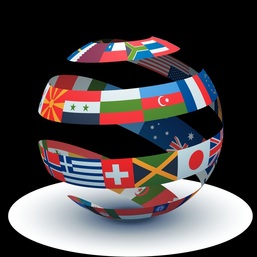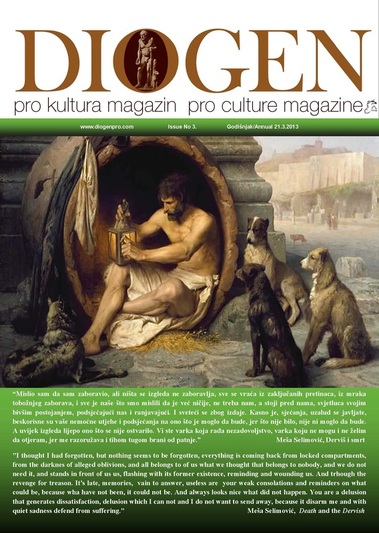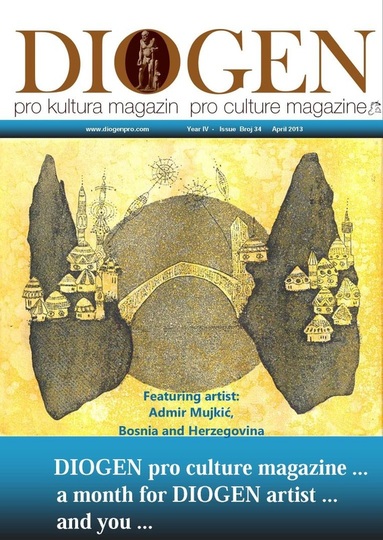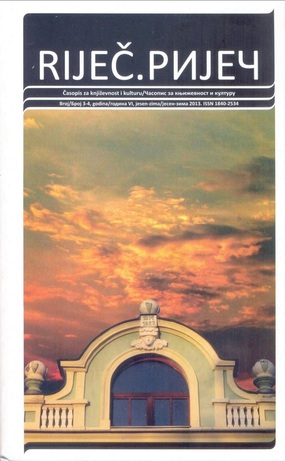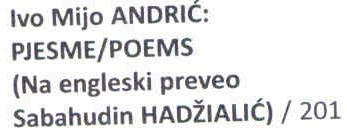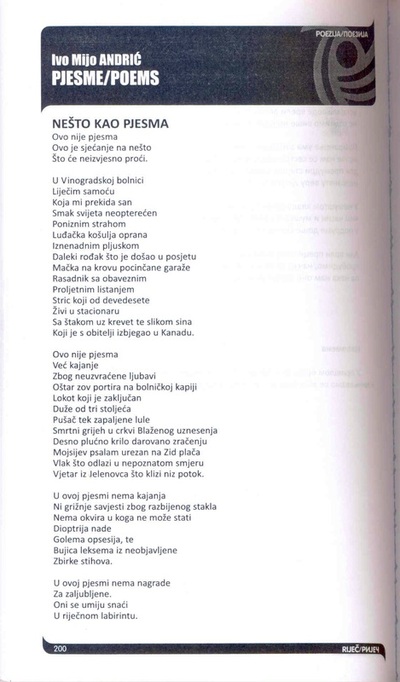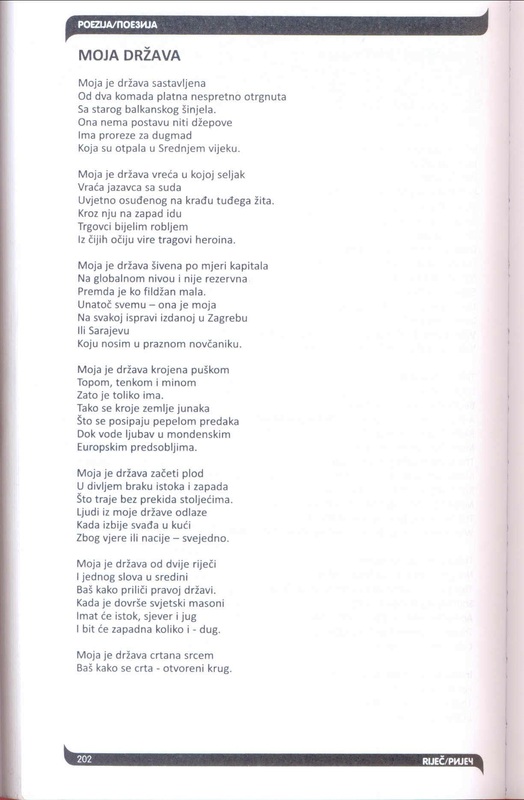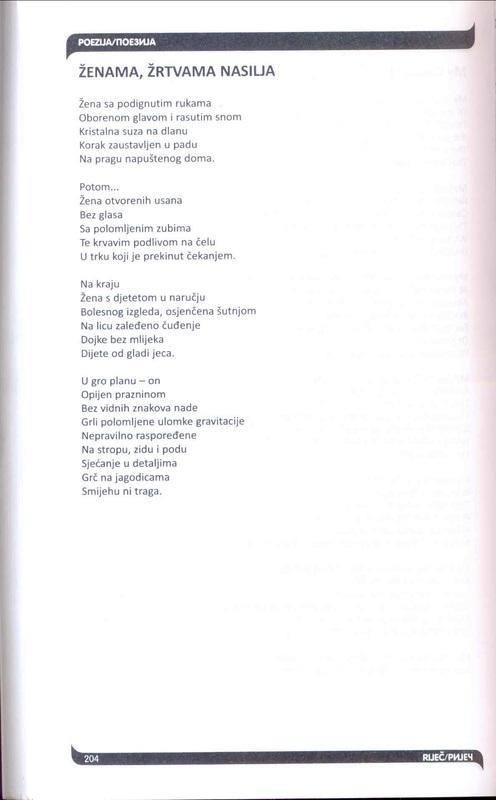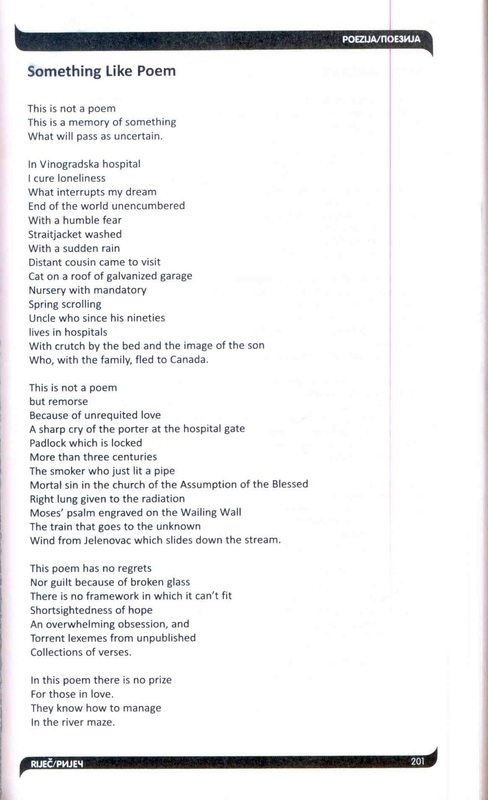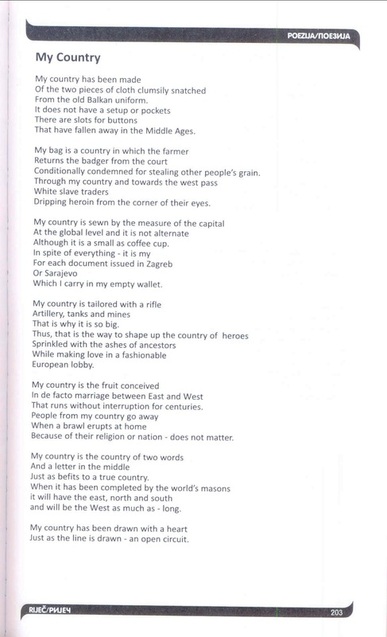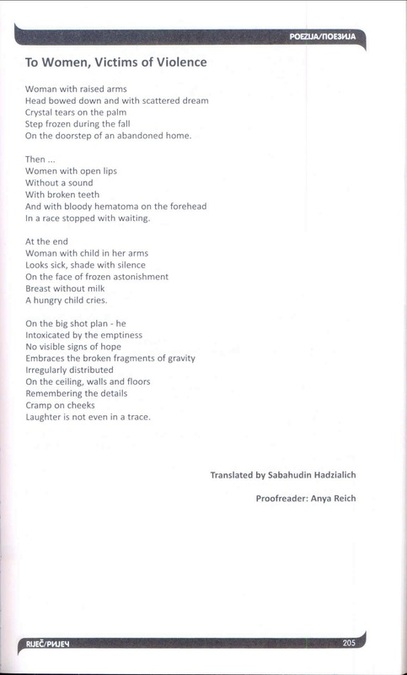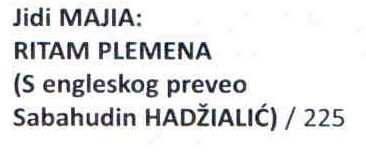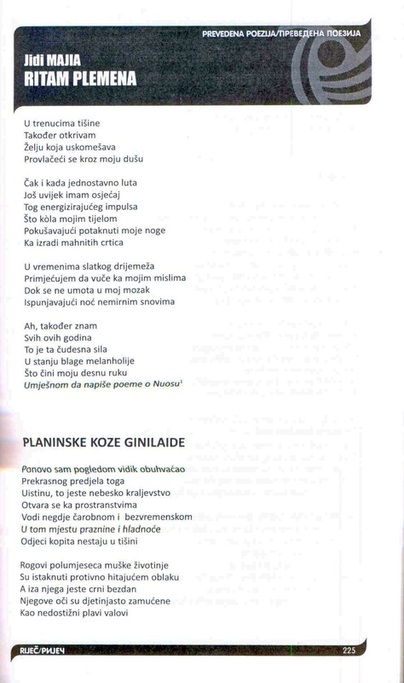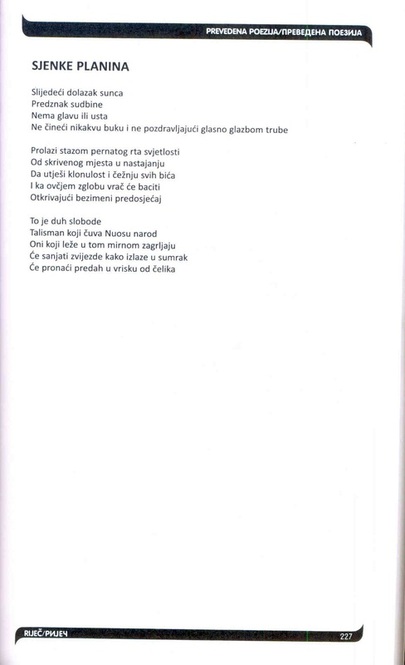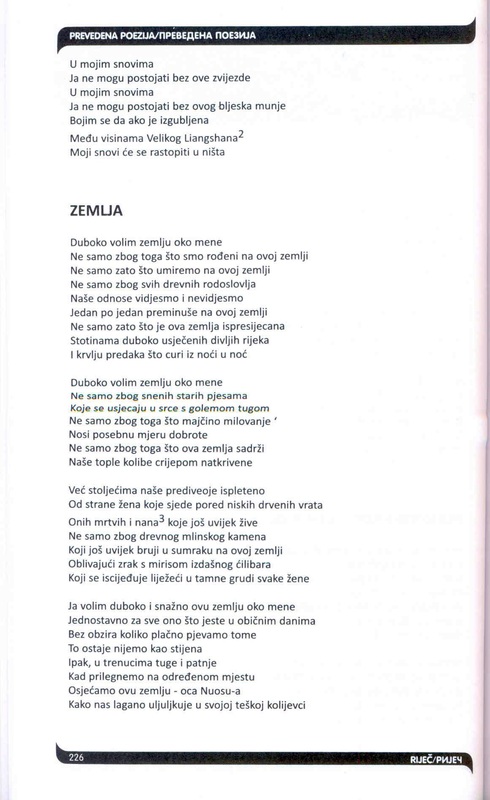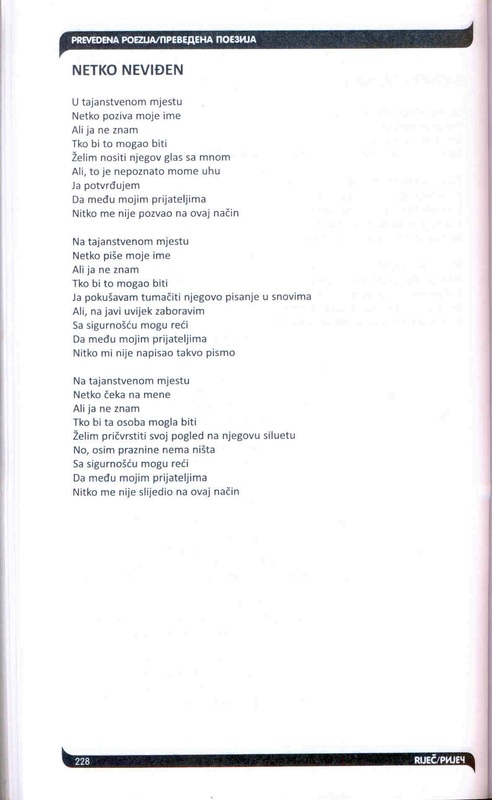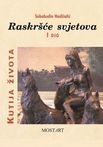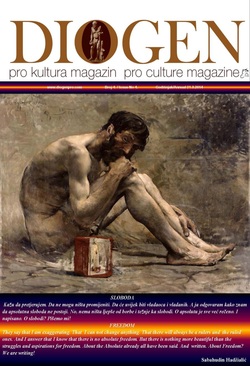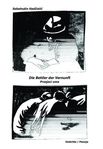|
NA LISTI Od 04.8.2010.g. /
LISTED SINCE August 4th, 2010 among leading European magazines: |
All Rights Reserved
Publishers and owners: Peter Tase and Sabahudin Hadžialić, Whitefish Bay, WI, United States of America MI OBJEDINJUJEMO RAZLIČITOSTI... WE ARE UNIFYING DIVERSITIES |
TRANSLATION AS THE GATE OF INTERACTION TOWARDS OTHER CULTURES
PREVOĐENJE KAO KAPIJA INTERAKCIJE PREMA DRUGIM KULTURAMA
Sabahudin Hadžialić, Sarajevo, Bosnia and Herzegovina
|
Prevoditi ili prepjevati
Veoma je teško metodološki razlučiti, a istovremeno je veoma jednostavno se suočiti sa izazovom objašnjenja naslova pretpostavljenog eseja. Naime, iako sa jedne strane prevođenje jeste uvođenje civilizacijskih[1], kulturoloških[2] i književnih[3] normi pretpostavljenih vremenu i prostoru u kojem živimo, s druge strane pred nama se razgrće svijet prepjeva koji otvara sasvim druga vrata. Raja. Da li? O tome nešto kasnije, a sada da odmah razdvojimo prevod od prepjeva iako se oba oblika itekako nadopunjuju. Prepjevava se poezija dok se novelistika, odnosno proza, prevodi. Ovako gruba definicija različitosti je veoma osjetljiva i postavlja niz pitanja koja traže odgovore. Na samom početku dolazi do, kod prevoda proze, pokušaja približavanja jedne kulture drugoj. Kako? Prevodilac se suočava sa prostorom i vremenom njemu neznanom, ili bar djelimično znanom, a želja mu je približiti se vremenu i prostoru u kojem trenutno živi. I prevodi. Upoznavanje sa djelom koje prevodi nije samo iščitavanje, poznavanje jezika prevoda i usmjerenost dugom i napornom radu „bukvalnog“ prevođenja. Ne! Pred njim je upoznavanje sa kulturom vremena i prostora koje/koji prevodi. On mora poznavati istorijsku, kulturološku i civilizacijsku potku onoga čemu je usmjeren i o čemu govori i radi tokom prevođenja, jer knjiga[4] mu se može dopasti ili ne, ali on mora biti istovremeno ne samo prevodilac već i istoričar, lingvista, sociolog, a i pomalo filozof i političar. Jer nikada se ne zna šta sve može biti „izgubljeno u prevodu“. Tada dolazimo do prepjeva koji se pojavljuje i kod proze kao nadgradnja jer tanka je linija između nečije svijesti o prevodu i činjenja istog. Da pojasnim- upravo zbog ulaska nečijeg djela u novi prostor, ali nerijetko i vrijeme, suočavamo se sa dva oblika prevođenja – doslovnim i slobodnim[5]. Kod prvog smo samo pod jurisdikcijom obaveza i vlastitog znanja jezika sa kojeg prevodimo[6], a kod drugog moramo itekako poznavati i vlastiti jezik na koji prevodimo. Da, i ne samo to, već i prepjevavanjem dotjerivati djelo. Sada dolazimo do interakcije prevoda sa prepjevom, jer nevidljiva je granica gdje prelazimo iz jednog u drugi dio rada. I činjenja. Veliki narodi imaju velike prevode i prepjeve, dok mali narodi imaju male prevode i prepjeve. No sve, ipak, zavisi od: 1. Usmjerenosti države da pomogne invaziju svojih djela na druge prostore i vremena 2. Snagu i umijeće onih koji prevode, odnosno prepjevavaju djela. Tačka 1. je veoma kontradiktorna jer i iz malih naroda dolaze veliki prevodi[7] ali i iz velikih. No, generalno gledajući, manji[8] narodi moraju više ulagati u prevode kako bi uobličili svoje mjesto pod suncem svjetske pojavnosti. Zahvaljujući Internetu, približili smo se apsolutnoj slobodi[9] koja može postati apsolutnom[10] samo dok ne ugrožava slobode drugih i drugačijih gdje možemo kontaktirati, razmjenjivati znanja i nade. A da nijednoga trenutka ne zaboravimo da smo, prije svega ljudi. No, tu je „kvaka 22“ koja upravo kod Interneta rađa sumnju. Jer, više od 95 % World Wide Weba je zagađeno svekolikim nakaradnim oblicima predstavljanja prevođenja i/ili prepjeva[11] koji čine medvjeđu uslugu kulturi iz koje dolaze. Tačka 2. je conditio sine qua non prevođenja, odnosno prepjevavanja. Iako se slažem sa Mladenom Machideom[12] koji postavlja sedam postulata kod prevođenja poezije: razlozi prevođenja[13], posljedice prevođenja[14], sumnja u prijevod kao takav, sjeta nakon prijevoda, moralizam uz prevođenje, solidarnost s drugim prevoditeljima, poetika i funkcija prevođenja, ja bih dodao još nešto. Jednostavno i nalazi se u dvije riječi: Prepjevani prevod[15] koji zna biti itekako dobra nadgradnja. Istovremeno, moramo voditi računa i o istorijskim pretpostavkama kada su prevodi, odnosno prepjevi u pitanju. Neka djela moraju čekati i stotine godina da budu prevedena, odnosno prepjevana zbog ovih ili onih razloga[16] a neka su tu, odmah, iza ugla, kao onomad „hljeba i igara“ gdje imamo kućne pisce i pjesnike, zavisno koliko su blizu vlasti ili ne. No, zahvaljujući liberalizaciji svijesti (unutar navedenih 5 %) kvalitet, a ne samo tržišna pretpostavka, zna ponekad avangardom biti. Ali strpljenje je potrebno. Zbog toga moram i odgovoriti na pitanje „Da li...?“ sa početka eseja o prevođenju ili prepjevavanju. Moramo samo voditi računa da nas valovi nadahnuća ne ponesu i ne razbiju o stijenje nadanja. Jedna je stvar šta je autor napisao, a sasvim druga kako smo mi to preveli ili prepjevali. Ako nismo „naučeni“ da mislimo upravo o tome. Dakle, prevod ili prepjev? I jedno i drugo, jer i prevod i prepjev su jednake snage samo kada su zajedno uobličeni u djelu koje se prenosi iz jedne kulture u drugo, iz jednoga prostora u drugi. Upravo na to je i mislio Jules Marouzeau u djelu Primjena latinskog jezika[17] kada je navodio probleme kod prenošenja djela iz jedne kulture u drugu. No, kao zaključak se nameću citati prevodilaca sa prostora Jugoistočne Evrope, Zlatka Crnkovića: „Kad se prijevod čita kao original, onda je to ljepota“[18] ili nesto malo istočnije kod Milorada Pavića, autora „Hazarskog rječnika“ i prevodioca Puškina[19] i Byrona koji kaže da lik Onjeginja sačinjavaju tri elementa: autobiografski, pojavnost lika i protivrječnost u liku. Ako uzmemo kao modus causalis i Zlatka kao i Milorada, dobijamo ono što svako prevođeno djelo mora imati: prevod i prepjev. U tome je rješenje, bez obzira da li govorimo o proznim ili poetskim djelima. Ako znamo šta činimo. Ne samo zbog sebe. Već prije svega zbog čitalaca kojima nudimo djelo na sud i razumjevanje. I posljednje, ali ne i zadnje je da ne smijemo nikada prenebregnuti da “Nije najveća budala onaj koji ne zna da čita, već onaj koji misli da je sve što pročita istina.”[20]. Da bi i sami znali čitati djela koja prevodimo, odnosno prepjevavamo, moram znati razlučiti istinu od laži. Tako je i sa prevođenjem odnosno prepjevavanjem. Jednostavno moramo[21] znati kada prevoditi a kada prepjevavati. To je priča bez kraja. Ali sa početkom. Na ovaj način promišljanja kroz esej upravo o tome. ------------------------- [1] Uz pripadnost istoj civilizaciji možemo samo očekivati i nagradnju kod prevođenja, odnosno prepjevavanja. Nameće se samo drugo pitanje: A šta je sa prevođenjem odnosno prepjevavanjem drugih civilizacija koji nestadoše u tmini vremena, prije nas? Kako možemo znati da li smo to „umetnuli“ u prevod ili prepjev kada govorimo o civilizaciji per se? [2] Iako kultura jeste cjelokupno naslijeđe društvene grupe i latinske riječi colere koja govori o „nastanjivanju, uzgajanju...“ čudna je to riječ. Naime, u vremenu koje živimo kultura nerijetko jeste izvitopereni oblik pojednostavljenih pretpostavki očekivanih nadanja – i kod prepjeva, odnosno prevoda. In medias res: Kulturom se zovu i rigidni oblici ljudskih sanja, unazađujući oblici prezentacije vlastitog naslijeđa usmjereni nipodaštavanju drugog i drugačijeg. Kako se boriti protiv toga? Kulturom, ali drugačijom. Promicanjem onih vrijednosti koje objedinjuju, nadahnjuju i ni jednoga trenutka ne čine drugom ono što ne bi željeli da neko nama učini. Teško je, ali kako i je Erih From napisao u djelu „Bjekstvo od slobode“: „Ali, zviždanjem u mraku ne stvara se svetlost.“ (Nolit, biblioteka Sazvežđa, Beograd, 1983.g., str.125). Valja nam delati. [3] O normama sve najbolje! Kada govorimo o tome moramo itekako znati razlikovati književni jezik i njegov prepjev i/ili prevod u odnosu na svakodnevni, sleng jezik kojeg živimo. [4] „Knjiga je poput škara, čekića ili čavla, jednom izmišljen predmet i nitko je više ne može bitno izmijeniti, poručio je i rekao kako se ne boji prognoza da će knjigu istisnuti moderni mediji jer će se knjiga "definitivno zauvijek koristiti“, Umberto Eco, Sajam knjiga u Istri, Hrvatska, 2006.g. [5] Naučno istraživački institut IBN SINA, Sarajevo – „Prevođenje kao umijeće i nauka“: http://www.ibn-sina.net/bs/component/content/article/367--prevoenje-kao-umijee-i-nauka.html [6] Peščanik: Boris Buden - „Vjerujem da ta činjenica mora biti povezana s tradicionalnim shvaćanjem prevođenja kao puke reprodukcije originala, reprodukcije kojoj manjka autentičnosti i vlastite autonomije“: http://pescanik.net/2008/12/o-prevodenju/ [7] Ivo Andrić: „Na drini ćuprija“ i Nobelova nagrada za književnost 1961.g. a dolazi iz maloga naroda sa Balkana [8] Po broju članova društvene zajednice i nikako drugačije [9] Iako ne jednom Erich Fromm u knjizi „Bjekstvo od slobode“ navodi da ona ne postoji, već permanentna borba za nju [10] A šta je „apsolut“ do božanski oblik vlastite svijesti o veličini insekata što se ljudima zovu . [11] Generalno, kako vec rekosmo, 95 % WWW je opterećeno neznanjem, licemjerjem, lažnim hedonizmom koji je usmjeren vrijeđanju i nipodaštavanju drugog i drugačijeg, drugim riječima, liječenjem vlastitih trauma bivajući, elektronskim putem, neko i nešto sasvim drugo. Dvadeset i pet procenata je na razmeđi znanja i neznanja. Kako to prevazići? Moj prijedlog je uvijek provjeriti šta je ta osoba i/ili grupa radila prije 10, 20, 30 godina i samo će vam se kazati. Evoluiranje, po mom skromnom mišljenju, u ljudskoj svijesti postoji samo do činjenice da mene ne ugrožava, jer ljudi su, snažnije od životinja, skloni divljenju i poslušnosti. Samo je potreban vođa ili više njih, i stoka je spremna za ispašu. Onih 5 % ostalih, drugačijeg mišljenja i stava su tu da budu snaga boljitku što stremi. [12] Kako prevoditi poeziju- Mladen Machiedo: http://www.matica.hr/Vijenac/vijenac418.nsf/AllWebDocs/Sedam_flasheva_o_prevodjenju [13] pozitivni [14] negativne [15] Objašnjenje je jednostavno: Iako u njegovim postulatima već ima navedenog, smatram da je potrebno izdvojiti „prepjevani prevod“ kao nadgradnju djela samoga, i to u saradnji sa autorom djela koje prevodimo (ako se radi o živućem, savremenom, autoru) gdje u toku prevođenja obavljamo razgovore i kontakte sa ciljem pojašnjenja određenih dijelova poetike. Poezija je čuđenje na svijetu. I tada dodajemo naš „schmek“ koji kreira novo djelo. Jer prepjevavanje je ponekad i nadgradnja samog djela. Primjer: Moje pjesme su prevedene sa BHS jezika na engleski 2011.g. od strane Anye Reich, a zatim sa engleskog na estonski jezik 2012.g. Univerzitetski profesor, prof.dr. Lauri Piltel, koji je prevodio moje pjesme sa engleskog je, radeći uvodni osvrt za časopis Akadeemia iz Tartua, Estonia (novembra/studeni 2012., broj 11., str. 2001.), uporedio stihove iz mojih deset pjesama sa poetikom djela Charlesa Bukowskog, Witolda Gombrowiča, Walta Whitmana, Ive Andrića, Mihaila Bulgakova, Danila Kiša i Meše Selimovića: http://sabihadzi.weebly.com/akadeemia-magazine-estonia.html . I šta poslije ovoga reći? Šutnjom se sve kazuje. [16] Jezički, ideološki, sociološki razlozi [17] Jules Marouzeau, Einführung ins Latein. Deutsche Übersetzung und Bearbeitung von André Lambert unter Mitwirkung von Heinz Haffter, Zürich und Stuttgart: Artemis Verlag, 1966. (original: 1954.), pogl. XI.: Primjena latinskog jezika. Preveo Ivica Studenović – „Da bih to mogao učiniti efektno, smatram umjesnim odrediti bitne pokazatelje dobra prijevoda: prijevod mora biti takav da čitatelj u njemu pronađe ne samo točan sadržaj teksta, izlaganje i slijed misli s njihovim nijansama, nego, koliko je to moguće, i oblik koji obuhvaća taj smisao: osobinu jezičnog blaga, gramatički oblik, sintaktičku strukturu, svojstvenost stila, tako da prevedeni tekst za nuždu može poslužiti kao podloga za interpretaciju ili prosuđivanje vrijednosti isto tako dobro kao i sam originalan tekst. "Točno izraziti sadržaj teksta", kaže A. Guillemin u jednom članku o teškoćama pri prevođenju (Revue des études latines, 1924. str. 182), "ali također izraziti i dojam koji čitatelj dobije čitajući tekst". "Biti vjeran", kaže Marcel Prévost u uvodu u svoj prijevod Heroida (Collection Budé, str. XXII), "ali također izraziti i svojstvenost stila…, dostići literarnu vrijednost originalnog teksta na francuskom …, francuskog čitatelja postaviti u onaj odnos prema francuskom tekstu u kojem se nalazio latinski čitatelj prema latinskom tekstu". Kvadratura kruga?, pita se Prévost. Zacijelo! "Izraziti latinski tekst na francuskom", kaže on, "predstavlja jedan od onih problema za koje matematičari kažu da imaju previše ograničenja kao npr. htjeti četiri nasumice postavljene točke spojiti kružnicom…u najvećem broju slučajeva najbolje što se može pokušati jest povući kružnicu kroz tri točke, a četvrtoj se približiti koliko je to moguće". Vrlo dobro! Mi ćemo sebi kao cilj postaviti ovo približavanje kvadraturi! Još posljednja poteškoća i posljednje upozorenje. Postoji jedna sklonost prevoditelja čiji su korijeni u našem spisateljskom častohleplju te ju je teško korigirati: to je pokušaj da se smisao žrtvuje obliku ili – kako se to rado kaže – doslovnost ljepoti. Pitanje koje učenici sebi često postavljaju i kojim ponekada izvode na megdan afinitete svojih učitelja, shvativši ih više ili manje ispravno, jest ovo: mora li biti točno ili se mora pisati na dobrom njemačkom? Ovo pitanje želim drugačije formulirati: s obzirom na ova dva jezika koji su oblikom i duhom tako različiti da je nemoguć direktan prijelaz s jednoga na drugi te se moraju primjenjivati beskrajni napori i dosjetke da bi se jedan izrazio drugim i uvijek izgleda da se toj zadaći nije doraslo – koji ćemo od ova dva nespojiva zahtjeva žrtvovati: vjernost tekstu ili ljepotu oblika? Ja bih bez oklijevanja i iz vlastitog iskustva, ma što me koštalo da poštivanje toga odgovora, rekao: ni jedan ni drugi. Ako postoji načelna spremnost za odustajanjem od dijela zadatka, to će se odraziti na cijeli zadatak. Prijevod mora biti točan i mora biti "njemački". Budući je nemoguće oba zahtjeva istodobno ispuniti, silom se prilika kod oba zaustavljamo na pola puta. No, ovo je približavanje vrjednije nego bilo kakva vrsta polovičnog rješenja koje bi nadomještalo manjak interesa za jedan zahtjev pretjeranom brigom za drugi. Najlošije bi za prevoditelja bilo iz principa se zadovoljiti kompromisima. Prijevod mora biti i ostati borba. U tom slučaju može prijevod, više nego vježba latinskog i njemačkog, postati plodna metodička vježba i čin duhovne čestitosti. Info: http://www.ffzg.unizg.hr/klafil/neven/marouz.htm [18] Info: http://www.jutarnji.hr/zlatko-crnkovic--kad-se-prijevod-cita-kao-original--onda-je-to-ljepota-/938456/ [19] http://www.lektire.me/prepricano/aleksandar-sergejevic-puskin-evgenije-onjegin_3 [20] Ivo Andrić, citat: http://www.bosnacitat.com/tag/citanje [21] Mada ne volim tu riječ jer je naredbodavajuća [22] Info: http://en.wikipedia.org/wiki/Casablanca_(film) |
Translating or Rendering[1]
It is very difficult to distinguish methodologically, and in the same time it is very easy to face with the challenge to explain the above title of the assumed essay. Thus, while on one hand translation is the introduction of civilizational[2], cultural[3] and literary[4] norms implied within the space and time in which we live, in the other in front of us is the uncovers the world of rendering that opens a entirely different door. Of the paradise. Does it? About that little bit later - now we should immediately separate the translation from rendering although both forms are very complementary. Verses[5] renders while novels and stories[6] translates. Such a rough definition of diversity is very sensitive and place many questions that needs answers. At the very beginning there is, within the translation of prose, try of the approach of one culture to another. How? The translator is faced with space and time unknown to him, or at least partially known, and his wish is that he wanted to get close to the time and space in which he currently lives. And translates. Introducing with the creation which he translates is not only reading, knowing the language of translation and orientation towards the long and difficult work of the "literal" translation. No! In front of him is to be introduced the culture of time and space which he translates. He must know the historical, cultural and civilizational weft of the issue he is focused on about which he is talking and doing about during the translation, because the book[7] he might like it or not, but in the same time he must be also not just a translator but a historian, linguist, sociologist, and a bit philosopher and politician as well. Because you never know what can be "lost in translation". Then we arrive to the rendering of which occurs within the prose as well as an upgrade because there is a thin line between a person's awareness of the translation and doing it. To clarify- Just because of entering of someone creations in a new space, but often also in new time, we are faced with two types of translation – literal kind and free kind[8]. At first we are just under the jurisdiction of our own responsibilities and knowledge of the language from which we are translating[9], and at the second we certainly have to know our own language on which are translating into. Yes, not just only that, but also we have to, through rendering, refining and shaping the creation. Now we comes to the interaction of the translation with rendering, because there is an invisible border where we cross from one to the another part of the work. And doing. Great nations have big translations and rendering, while small nations have small translations and renderings. However all, in fact, depends on: 1. Orientation of the state[10] to assist the invasion of its creations into other spaces and times 2. The strength and skill of those who translates and renders the creations. Item 1. is very contradictory because also from small people comes big translations[11] but also from great nations. But, generally speaking, the smaller[12] nations must invest more in translating to shape up their place under the sun of the world appearances. Thanks to the World Wide Web, we have come closer to the absolute freedom[13] which can become absolute[14] only until it threatens the freedom of others and different ones, where we can make contacts, exchange of knowledge and hopes. And in any moment not to forget that we are, first and foremost, the humans. But there is a "catch-22" that exactly at Internet generates suspicion. Because more than 95% of the World Wide Web is polluted with overall ugly forms of representation of translation and / or renderings[15] that makes disservice for the culture they come from. Item 2. is a conditio sine qua non of translation and/or rendering. Though I agree with Mladen Machideom[16] who sets seven postulates within translating of poetry: the reasons of translation[17], translation[18] effects, questioning the translation as such, melancholy after translation, moralism with translation, solidarity with other translators, poetry and function of translatio, I would add one more thing. Simple one and it is in two words: Rendered translation[19] which can be very good upgrade. At the same time, we must take into account the historical assumptions when translating and/or renderings are in question. Some creationss have to wait hundreds of years to be translated and/or rendered for one reason or another[20], and some are here, just around the corner, as once upon a time "bread and games" where we have a home writers and poets, depending on how close to the government or not they are. But, thanks to the liberalization of consciousness (within the specified 5%) the quality, and not just assumption of the market, sometimes knows how to be avangard. But the patience is needed. Because of that I have to answer the question "Does it ...?" from the beginning of the essay on translation or rendering. We just have to make sure that the waves of inspiration do not carry us and crash us the rocks of the hopes. One thing is what the author has written, and quite another one how we translated or rendered it. If we are not "taught" to think just about it. So, translation or rendering? Both, because the translating and the rendering are of the equal forces only when they are molded wtihin the creation which is transferred from one culture to another, from one area to another. Just on that have thought Jules Marouzeau in The application of Latin language[21] when he mentioned problems in transferring creations from one culture to another. However, as a conclusion imposes quotes of the translators from the area of South-Eastern Europe, Zlatko Crnkovic: "When you read the translation as the original, it's beautiful[22]," or something slightly towards East at Milorad Pavic, author of "Khazar Dictionary" and the translator of Pushkin[23] and Byron, who says that the character of Onegin has been made up of three elements: the autobiographical character, appearance of the character and contradiction within the character. If we take as a modus causalis both, Zlatko and Milorad, we get what every translated creation must have: translation and rendering. In that is the solution, regardless if we're talking about fictional or poetic creations. If we know what we are doing. Not just for ourselves. But primarily for readers to whom we offer the creation for judgment and understanding. And last, but certainly not the least is that we must never overlooked that "he's not the biggest fool who can not read, but the one who thinks that everything he reads is true[24]." To be able by ourselves to read creations which we are translating or rendering, we need to know how to separate the truth from the lie. It is the same with translation as well as with rendering. Simply, we have to know when to do the translation and when to do rendering. Simply, we have[25] to know when to translate and when to translate. It is a never ending story. But with the beginning. In this way of thinking through an essay just about it. -------------------------------- [1] In verse(poetry) and/or prose [2] With affiliation to the same civilization, we can only expect upgrade at the translation or rendering. The second question just imposes: What about translating or rendering other civilizations that vanished into the darkness of time, before us? How we could know if we are "inserted that" in the translation or rendering when we talks about civilization per se? [3] Although the culture is the heritage of the whole group and the Latin word colere that talks about the "colonization, farming ..." it a strange word. In fact, we live in a time when culture is often gets skew form of simplified assumptions of expected hopes - with translations or rendering. In medias res: Culture is called aqlso the rigid forms of human dreams, downgrade forms of the presentation of own legacy aimed towards underrate of other and different one. How do you fight against that? Through the culture, but different kind. Promoting those values that unite, inspire, and for a one moment not doing to others what we would not want someone to do to us. It is difficult, but as Erich Fromm wrote in the book "Escape from Freedom", "But, through whistling in the dark the light is not created." (Nolit, library Constellation, Belgrade, 1983, p.125). All we have to do is to act effectively. [4] About the the standards (the norms) all the best! When we talk aboutthat we have to know to make difference between literary language and its rendering and /or translation in relation to the daily, slang language in which we live. [5] Poetry [6] Prose [7] "A book is like a pair of scissors, a hammer or a nail, once fictional subject and nobody is no longer can change it significantly, he said, and said that he is not afraid of the forecasts that modern media will overpower the book because the book is" definitely will be in use forever, " Umberto Eco, Book Fair in Istria, Croatia, 2006. [8] Scientific Research Institute IBN SINA, Sarajevo - "Translation as the art and the science": http://www.ibn-sina.net/bs/component/content/article/367--prevoenje-kao-umijee-i-nauka.html [9] Peščanik: Boris Buden - "I believe that this fact must be associated with the traditional idea of translation as a mere reproduction of an original, which lacks authenticity and autonomy of its own": http://pescanik.net/2008/12/o-prevodenju/ [10] country [11] Ivo Andrić: "The bridge on the Drina" and the Nobel Prize for Literature 1961 and it comes from the little people from the Balkans. [12] According to the number of members of the community and not in any other way. [13] Although not just once Erich Fromm mentioned in his book "Escape from Freedom" that it does not exist, but the ongoing/without stop battle for her... [14] And what is the "absolute" than divine form of your own mind about the size of insects whom somebody call the people. [15] Generally, as we stated, 95 % of the WWW is burdened with ignorance, hypocrisy, false hedonism that is directed towards insults and scorn of other and different ones, in other words, treating of own trauma becoming, electronically, entirely something else. Twenty-five percent is at the crossroads of knowledge and ignorance. How to overcome this? My suggestion is to always check what is that person and /or group was/were doing 10, 20, 30 years ago, and you will know. Evolution, in my humble opinion, in human consciousness exists only to the fact that it does not threaten me, because humans, stronger than animals, tends towards admiration and obedience. Just need a leader or more of them, and the livestock is ready for pasture. Those 5% of others, with different opinion and attitude are here to be a force of the betterment as directed towards. [16] How to translate poetry-Mladen Machiedo: http://www.matica.hr/Vijenac/vijenac418.nsf/AllWebDocs/Sedam_flasheva_o_prevodjenju [17] positive [18] negative [19] The explanation is simple: Although within his postulates exists already mentioned, I think that it is necessary to separate "rendered translation" as upgrade of the creation itself, and that in collaboration with the author of the creation, which we are translating (in a case of the living, contemporary, author), where in the course of translating we conducts interviews and contacts with a a goal to have clarification of the certain parts of poeteic. Poetry is a wonder in the world. And then we add our "schmek" which creates a new creation. Because sometimes rendering is an upgrade of the creation itself. Example: My poems are translated from BHS language into English in 2011. by Anya Reich, and then from English into Estonian in 2012. University professor, Ph.D. Lauri Piltel, who has translated my poems from English, working on an introductory overview for the journal Akadeemia from Tartu, Estonia (November / December 2012th, No. 11, p. 2001.), have compared verses from my ten poems with poetic of the creation of Charles Bukowski, Witold Gombrowich, Walt Whitman, Ivo Andric, Mikhail Bulgakov, Danilo Kis and Mesa Selimovic: http://sabihadzi.weebly.com/akadeemia-magazine-estonia.html . And what to say after this? Through silence you say everything. [20] Linguistic, ideological, sociological reasons [21] Jules Marouzeau, Einführung ins Latein. Deutsche Übersetzung von und Bearbeitung André Lambert unter Mitwirkung Heinz von Haffter, Zurich und Stuttgart: Artemis Verlag, 1966. (Original: 1954.), Sec. XI.: The application of Latin language. Translated by Ivica Studenović - "Yes to could do that effectively, I thinks that should be determined the essential parameters of a good translation: the translation must be such that the reader finds in it not only the exact content of the text, display and sequence of thoughts with its nuances, but, as far as it is possible, the shape/form that encircle that meaning: the form of linguistic treasure, grammatical form, syntactic structure, peculiarities of style, so that makes the translated text to be able to serve as a basis for interpretation or judgment of the valuation as well as the original text. "Exactly express the content of the text," says A. Guillemin in an article about the difficulties in translating (Revue des études latines, 1924. P. 182), "but also expressed the impression which the reader gets through reading of the text." "To be faithful" says Marcel Prévost in the introduction to his translation of Heroida (Collection of Buddha, p. XXII), "but also to express distinctiveness of a style ... achieve literary value of the original text in French ..., to set up French readers in that kinf of relation to the French text exactly as which Latin reader was towards the Latin text. " Squaring the Circle? asks Prévost himself. Certainly! "Express the Latin text in French," he says, "is one of those problems that mathematicians say that they have too many restrictions, such as four randomly spots to connect with a circle ... in most cases the best is that we can try is to draw a circle through three points, and to bring as much as possible towards the fourth. " Very good! We set a goal for ourselves this convergence to the quadrature! Another difficulty and the last - final warning. There's a tendency of translators whose roots are in our literary ambition, and it is difficult to be corrected: it is an attempt to sacrifice the sense to the shape/form - how to say that in a happy way - literal towards a beauty. Question that students often ask themselves and that sometimes takes a fight against the affinities of their teachers, being able to understand it more or less correctly, is this: can it be true or must it would be writen in good German? This question I woul like to formulate differently: Considering these two languages which are both, in form and spirit, so different, it is impossible to have direct transition from one to the other, and must be applied endless efforts and drolleries to express one with another and it always seems that we can do the task and/or is not developed enough to deal with - which one of these two incompatible demands we will sacrifice: fidelity to the text, or beauty of the form? I would without hesitation, and from my own experience, no matter what it cost me to respect this response, say neither of them. If there is a readiness in principle to a abjure of a portion of the task, it will affect the whole task. Translation must be accurate and must be "German". Since it is impossible to simultaneously fulfill both requirements, the force of circumstances in both we are stopping halfway. However, this convergence is more valuable than any kind of half solution that would compensate the lack of interest for one claim through excessive concern for anothe claim. The worst would be for a translator that from principles to satisfy with the compromises. The translation must be and remain a struggle. In that case, the translation may be, more than the exercise of Latin and German language, become fruitful exercise and methodical act of spiritual integrity. Info: http://www.ffzg.unizg.hr/klafil/neven/marouz.htm [22] Info: http://www.lektire.me/prepricano/aleksandar-sergejevic-puskin-evgenije-onjegin_3 [23] http://www.lektire.me/prepricano/aleksandar-sergejevic-puskin-evgenije-onjegin_3 [24] Ivo Andric, quote: http://www.bosnacitat.com/tag/citanje [25] Although I do not like that word because has ordering in it. [26] Info: http://en.wikipedia.org/wiki/Casablanca_(film) Translated from BHS language in English by author |
|
| ||||||||||||||||||||||||
Narudžba knjiga / Purchasing of the books / Bücher bestellen
.
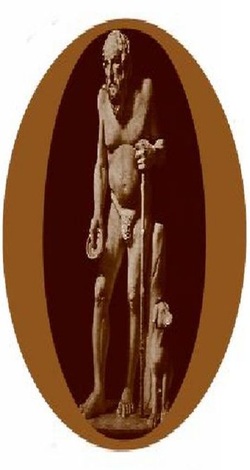
Copyright © 2015 Peter Tase & Sabahudin Hadžialić
Design: Sabi / Autors & Sabahudin Hadžialić. Design LOGO - Stevo Basara.
Freelance gl. i odg. urednik od / Freelance Editor in chief as of 2009: Sabahudin Hadžialić
All Rights Reserved. Publishers and owners: Peter Tase & Sabahudin Hadžialić
Whitefish Bay, WI, United States of America
Diogen pro kultura magazin (Online)
ISSN 2296-0929
Diogen pro kultura magazin (Print)
ISSN 2296-0937
Library of Congress USA / Biblioteka - Knjižnica Kongresa SAD
Contact Editorial board E-mail: [email protected];
Narudžbe/Order: http://www.diogenpro.com/diogen-all-in-one.html
Pošta/Mail USA: Peter Tase, 5023 NORTH BERKELEY BLVD. WHITEFISH BAY, WI, 53217, USA
Pošta/Mail BiH: Sabahudin Hadžialić, Grbavička 32, 71000 Sarajevo i/ili Dr. Wagner 18/II, 70230 Bugojno, Bosna i Hercegovina
Design: Sabi / Autors & Sabahudin Hadžialić. Design LOGO - Stevo Basara.
Freelance gl. i odg. urednik od / Freelance Editor in chief as of 2009: Sabahudin Hadžialić
All Rights Reserved. Publishers and owners: Peter Tase & Sabahudin Hadžialić
Whitefish Bay, WI, United States of America
Diogen pro kultura magazin (Online)
ISSN 2296-0929
Diogen pro kultura magazin (Print)
ISSN 2296-0937
Library of Congress USA / Biblioteka - Knjižnica Kongresa SAD
Contact Editorial board E-mail: [email protected];
Narudžbe/Order: http://www.diogenpro.com/diogen-all-in-one.html
Pošta/Mail USA: Peter Tase, 5023 NORTH BERKELEY BLVD. WHITEFISH BAY, WI, 53217, USA
Pošta/Mail BiH: Sabahudin Hadžialić, Grbavička 32, 71000 Sarajevo i/ili Dr. Wagner 18/II, 70230 Bugojno, Bosna i Hercegovina



